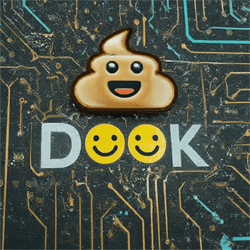AI is going to take all the jobs. The robots are coming.
These are subjects of great debate. Personally, I fall into the camp where I think these are valid outcomes. The pace of technological advancement, to me, means that most knowledge work will be done by computers. Robotics are bridging the gap between the digital and physical worlds.
What this means is that humans are simply too slow. Economic productivity will explode because people are removed from a large portion of the equation.
Of course, this does not bode well for a society that is based upon income capital. Here is where a transition is required.
Over the last year or so, we dove into this subject a great deal. This article will discuss another opportunity that the masses will involve themselves with.

Image generated by Ideogram
Distributed Infrastructure Income
We seem to love our acronyms. Here is another one for you: DePINs
This stands for Decentralized Physical Infrastructure Networks. It is all part of distributed computing and likely a major shift in income potential for the future.
In other words, our devices are going to be used to generate income streams. We already see in this to a degree with the ability to produce content. However, this is going to advance to another level once people understand they are going to contribute to the physical networks around them.
What are we looking at?
As a report by Messari suggests, DePIN could add $10 trillion to the global GDP (gross domestic product) in the next decade and $100 trillion the decade after.
Consider those numbers. Decentralized infrastructure is going to add $10 trillion to global GDP, or about 10%, by the middle of the next decade. By the middle of the one after that (2045), this will be around the size of the economy today.
Let that sink in.
So why are people worried about how people will survive? What is with the questions about how people will get money to live on?
If this assessment is correct, it is very evident how this will operate.
Web 3.0 Everywhere
For those involved in Web 3.0, this is something that is becoming evident. The consistent push towards decentralization means that different protocols are being built that enhance the opportunity. Devices all over the world are being offered up by unrelated parties. Much of this is serving as the foundation for these networks that are forming.
When we look at a public blockchain network, we clearly see how things are evolving. Under this scenario, the infrastructure is not centralized. Many entities run nodes, providing a valuable service. It is not much different than the server set up of a major entity such as Meta. The difference is one company doesn't own the infrastructure.
This is a premise that will extend to every layer of the stack.
We are going to see storage, processing, data, and retrieval. This could also extend into other areas such as energy.
Naturally, not all of this is Web 3.0, at least as we see it now However, in the future, there a payment system is required. This can be done by centralized entities. The challenge there is how do you distribute things in a decentralized manner than have a centralized entity controlling the payments?
It is rather counterintuitive.
For this reason, it makes sense that cryptocurrency could be the process laid on top. This is a payment system that is inherent in the digital realm. As this expands, more people will find their devices monetized.
At the core of this is simply addressing some of the growing needs by optimizing the resources already out there. For example, many have unused storage space on their computers. This is something that can be allocated to others.
Blockchain At The Core
This means that blockchain is likely to be at the core of most of what we are doing in the future. As the digital world expands, this will be the network basis that emerges as dominant. There will still be other networks built for specific purposes but the infrastructure will be integrated with this.
Why is that likely the case?
If we look at the benefits of blockchains, these are some of the common attributes:
- Higher level of security – no single point of failure
- Transparency
- ost efficiency
- Scalability
- Financial rewards for network contributors
Scalability and resiliency are two of the key factors. When becoming more dependent upon these networks, it is vital that they keep running. We also need to somehow meet the astronomical increase in digital demand we are facing.
This means that cryptocurrency is crucial to the next generation of the Internet. Web 3.0 is more than just green candles and Lambos. The entire industry has a black eye due to the fact that most cannot get passed this. It is also why the masses are overlooking the entire transformation that will take place.
Infrastructure Income
The future is one where people are receiving income for their contribution to infrastructure.
Let us look at a topic that I discussed elsewhere: inference.
This is crucial to AI. While LLMs are getting all the attention, the flipside is a massive amount of compute will be required to handle all the queries. Where is this going to come from?
For the moment, a company like Meta handles both. You log onto their website and use Llama3.1, their servers process it. Here the centralized aspect of things is evident.
What about in the future?
Consider this idea: when your computer is sitting idle, what if it was handling AI prompts? This means that, while you are sleeping, watching a game, or doing whatever, the computer is processing data and earning come crypto.
Now multiply this by all devices that have processing capabilities.
This is where Web 3.0 is going to affect the lives of every human on the planet. It is also something that is not discussed very much.
Posted Using InLeo Alpha
